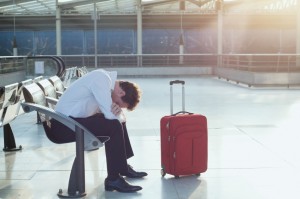 Taking a plane to visit grandparents in Florida, or a sibling living overseas can be a fun way to spend your holidays. However, be aware that travelling during the winter makes us particularly vulnerable to the flu. With so many people sick during the winter season, germs can collect quickly in enclosed areas like trains, buses or planes. So what’s your everyday traveller supposed to do to keep their immune system on lock-down while travelling, and avoid arriving sick at their destination? We’ve got everything you need to know about staying healthy while on the go.
Taking a plane to visit grandparents in Florida, or a sibling living overseas can be a fun way to spend your holidays. However, be aware that travelling during the winter makes us particularly vulnerable to the flu. With so many people sick during the winter season, germs can collect quickly in enclosed areas like trains, buses or planes. So what’s your everyday traveller supposed to do to keep their immune system on lock-down while travelling, and avoid arriving sick at their destination? We’ve got everything you need to know about staying healthy while on the go.
Bring Hand Sanitizer
Even without taking pharmaceutical training, most people know that hand sanitizer is critical to stop germs dead in their tracks. The worst breeding ground for these pesky flu-carriers are bathrooms, as they are high-traffic areas which are rarely cleaned in between journeys. Airplane trays are another germ hotspot—how often have you seen a crew member wiping down trays? You know how people walk through the aisles and use the seats for stabilizing support? This means aisle seats are the most likely to carry bacteria from sick passenger’s hands. The takeaway here is clear: always bring your own hand sanitizer! A package of disinfectant wipes is also useful, so you can wipe down suspect surfaces like your airplane tray.
Drink Bottled Water
The bacteria found in tap water can vary depending on the area, and although you can drink tap water with no problems at home, the difference in bacteria overseas may upset your stomach. Filtered bottled water is less likely to upset your stomach, and is therefore your best bet for staying hydrated (minus bacteria). Make sure that if you order bottled water, you pass on ice, which is usually made using tap water. But we definitely advocate prudent hydration. Air plane air is usually very dry, which can dehydrate your nasal passage, making you more susceptible to infection.
Don’t Shock Your Stomach
Watching what you eat can be just as important as preventing germs. Fertilizers used in some countries to grow food carry more bacteria than the fertilizers used at home. Some of the best advice when it comes to eating produce from another country is to cook it or peel it first. Fruits like oranges and carrots, which can be peeled are usually the safest to eat. Also ask if dairy is pasteurized or not, and make sure the meat you eat is at least medium to well-done. Unless it’s five star and Zagat-rated, opting for tar-tar is probably not the smartest idea when eating at a new, untested restaurant. Taking a food safety training class can be extremely helpful when travelling and eating overseas!
Bring Your Own Medication
Pharmaceutical quality control may be different in another country, leading to different formulas for medications. Sometimes, you won’t even be able to find a certain medication from back home in the country you’re visiting. For these reasons, it is best to bring your own medication—a trusted brand that you know has worked in the past to remedy your cold, headache or pain. Don’t make the mistake of assuming that your destination will have what you consider well-known medications like Gravol or Tylenol.
What are your go-to tips for staying well on the road?



